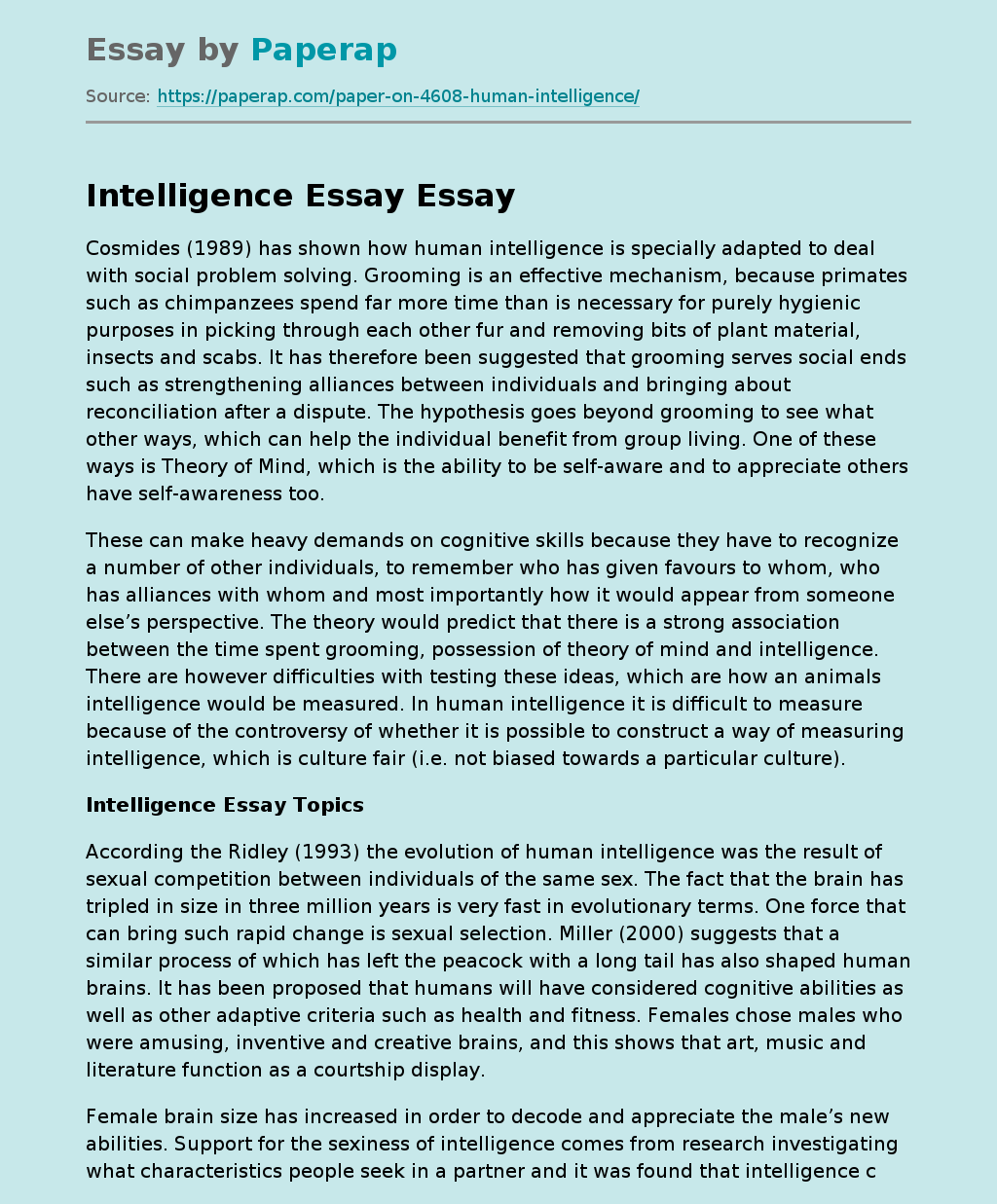Intelligence Essay
Cosmides (1989) has shown how human intelligence is specially adapted to deal with social problem solving. Grooming is an effective mechanism, because primates such as chimpanzees spend far more time than is necessary for purely hygienic purposes in picking through each other fur and removing bits of plant material, insects and scabs. It has therefore been suggested that grooming serves social ends such as strengthening alliances between individuals and bringing about reconciliation after a dispute. The hypothesis goes beyond grooming to see what other ways, which can help the individual benefit from group living.
One of these ways is Theory of Mind, which is the ability to be self-aware and to appreciate others have self-awareness too.
These can make heavy demands on cognitive skills because they have to recognize a number of other individuals, to remember who has given favours to whom, who has alliances with whom and most importantly how it would appear from someone else’s perspective. The theory would predict that there is a strong association between the time spent grooming, possession of theory of mind and intelligence.
There are however difficulties with testing these ideas, which are how an animals intelligence would be measured. In human intelligence it is difficult to measure because of the controversy of whether it is possible to construct a way of measuring intelligence, which is culture fair (i.e. not biased towards a particular culture).
Intelligence Essay Topics
According the Ridley (1993) the evolution of human intelligence was the result of sexual competition between individuals of the same sex.
The fact that the brain has tripled in size in three million years is very fast in evolutionary terms. One force that can bring such rapid change is sexual selection. Miller (2000) suggests that a similar process of which has left the peacock with a long tail has also shaped human brains. It has been proposed that humans will have considered cognitive abilities as well as other adaptive criteria such as health and fitness. Females chose males who were amusing, inventive and creative brains, and this shows that art, music and literature function as a courtship display.
Female brain size has increased in order to decode and appreciate the male’s new abilities. Support for the sexiness of intelligence comes from research investigating what characteristics people seek in a partner and it was found that intelligence came consistently at the top of the list. In the EEA meat was an important source of saturated fat. Stanford believes that strategic sharing of meat paved the way for human intelligence, as it will have forged alliances, persuaded females to mate (i.e. ‘meat for sex hypothesis’).
Strategic meat sharing requires considerable cognitive abilities because males would have to keep a running score of debts, credits and relationships. Evidence from the animal kingdom supports the meat for sex hypothesis, because male chimps use meat to entice females, often withholding it until mating and when begging for meat receptive females have more success than non-receptive. Evidence also comes from human societies, in terms of the Ache in Paraguay. Mitani and Watts (2001)showed that male chimps share with each other more than females due to alliances rather than sex.
It can be concluded that intelligence is a key component in the adaptability of a species. Three main theories have been proposed for the evolution of intelligence, which are, ecological, social and sexual selection. At this time the social theory provides the more plausible explanation of intelligence. However all of these ideas are continuing to be researched, so that an even more reliable explanation of the evolution of intelligence can be produced in the near future.
Intelligence Essay. (2019, Dec 05). Retrieved from https://paperap.com/paper-on-4608-human-intelligence/

